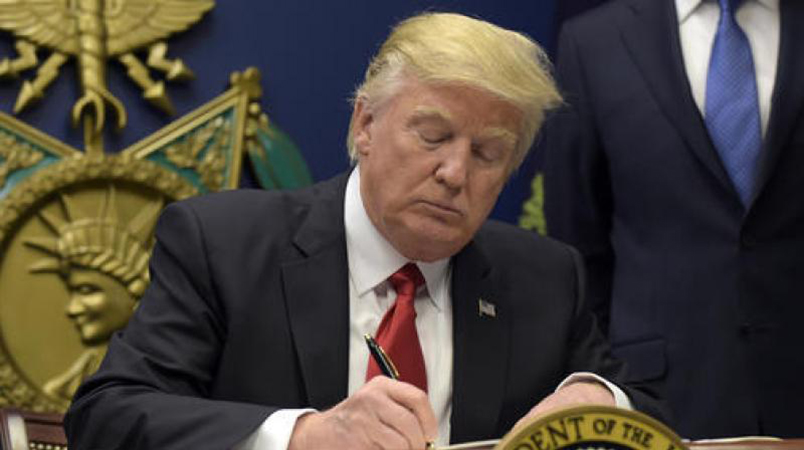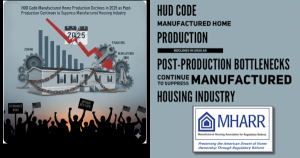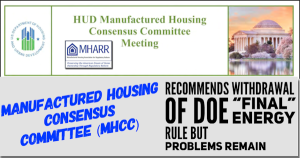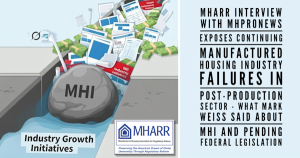In an April 26, 2017 communication to U.S. Department of Energy (DOE) Secretary, Rick Perry (copy attached), MHARR reiterated its March 10, 2017 call for the withdrawal of DOE’s June 17, 2016 proposed manufactured housing energy rule, asserting, as yet another ground for the proposed rule’s retraction, a March 28, 2017 Trump Administration Executive Order (EO) which nullifies a significant element of DOE’s regulatory cost-benefit analysis, allegedly showing national and “global”-level benefits from the rule which exceed costs.
Specifically, DOE’s statutorily-required cost-benefit analysis of the proposed manufactured housing energy rule relied, in substantial part, on a “Social Cost of Carbon” (SCC) mechanism developed by an Obama Administration “inter-agency working group,” to provide alleged monetary values for reductions in emissions of greenhouse gasses – on a “global” basis — claimed by DOE to be attributable to the proposed rule.
In its August 2016 written comments to DOE on the proposed rule, MHARR aggressively opposed the Department’s use of the SCC monetary values as a de facto “thumb on the scale” to produce exaggerated, phantom alleged “benefits” which were then netted against alleged “costs” which substantially understated the true cost of the proposed rule for both homebuyers and industry members. MHARR stated, in part:
“DOE admits that alleged SCC benefits are ‘uncertain’ and ‘should be treated as revisable.’ Thus DOE attributes ‘benefits’ to the proposed rule based on metrics acknowledged to be ‘uncertain,’ while it totally ignores predictable consumer, industry and national level costs of the proposed rule … thus over-inflating the alleged benefits of the proposed rule with junk science while significantly understating its costs. Indeed, while DOE exhibits great concern over the global ‘social costs’ of carbon, it apparently could care less about the domestic social cost of millions of Americans who would be excluded from the benefits of homeownership under its rule, as it makes no effort whatsoever to quantify or consider those costs, which would be enormous. *** Given each of these fatal defects in the utilization of arbitrary and speculative SCC values – and the other fundamental analytical and data failures of the June 17, 2016 DOE cost-benefit analysis, that ‘analysis’ is factually worthless ….”
(Emphasis added).
MHARR’s objections to DOE’s use of the SCC monetary values were in addition to other points raised by MHARR, showing that DOE’s alleged cost-benefit “analysis” was, in fact, fatally flawed. These additional fundamental defects included, but were not limited to: (1) its total failure to quantify or account for testing, enforcement and regulatory compliance costs; (2) its total failure to account for the individual, industry and national-level economic impact of the exclusion of millions of lower and moderate-income Americans from home ownership due to costs attributable to the rule; (3) its total failure to quantify or certify unique and disproportionate cost impacts of the proposed rule on smaller industry businesses; and (4) its total failure to quantify or account for the disruptive industry impact of successive standards changes under the proposed rule. These defects, moreover, were in addition to the irretrievably-tainted process that led to the proposed rule.
Now, though, as was initially reported by MHARR in its April 19, 2017 Washington Update, Section 5 of Executive Order 13783, “Promoting Energy Independence and Economic Growth” (March 28, 2017), expressly provides that the November 2013 SCC “Technical Update” relied-upon by DOE in support of the June 17, 2016 proposed manufactured housing rule, is “withdrawn as no longer representative of [federal] government policy.” (Emphasis added). In addition, EO 13783 expressly disbands the “inter-agency working group” that developed the SCC and its various updates and iterations.
Insofar as DOE expressly relied upon the now-invalidated SCC construct and related monetary values to conclude that national-level environmental and related economic benefits would accrue under the proposed rule leading, in substantial part, to its broader conclusion that alleged benefits of the proposed rule would exceed its alleged costs, its cost-benefit analysis is necessarily invalidated and nullified by the President’s Executive Order.
For this reason, as well as the multitude of other reasons set forth in MHARR’s comments – including DOE’s fundamentally and irretrievably-tainted standards development process – DOE’s proposed rule must be withdrawn in toto, as lacking any substantive basis, or demonstrable benefits exceeding its significant known and predictable costs. (It is unfortunate that a segment of the industry went along with the development of this proposed rule, effectively resurrecting it after it had been stopped by MHARR for years).
MHARR’s, communication, therefore, calls – again – on Secretary Perry to retract the proposed manufactured housing energy rule.
(Photo Image Credits: MHProNews.com/GraphicStock)













